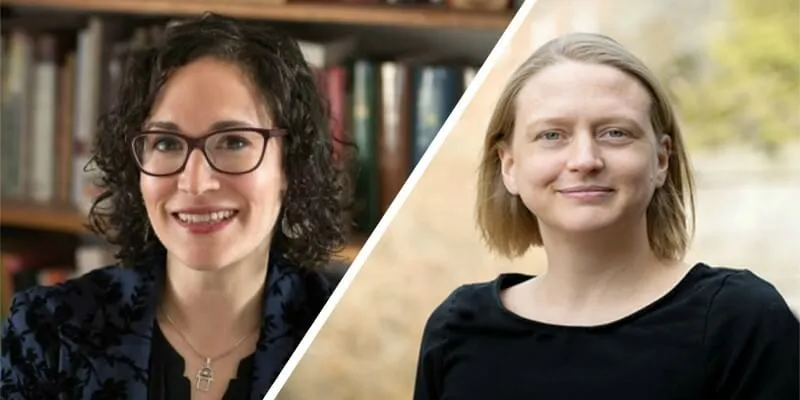Two of the four winners of the UVM Kroepsch-Maurice Excellence in Teaching Awards this year are from the College of Arts and Sciences. Ilyse Morgenstein Fuerst, associate professor of religion, and Ingrid L. Nelson, assistant professor of geography, both believe that a key to their teaching is meeting students where they are at.
For Morgenstein Fuerst, a specialist in Islamic studies, that means challenging stereotypes that students have about Islamic culture.
“My students were born right around 9/11, so I feel responsible for unteaching the negative stereotypes about Islam that, even under best of circumstances, no one growing up in this country is immune to,” she explains.
She understands her courses represent the first in-depth study of a religion that most of her students have ever undertaken, so she makes a pact with them.
“My teaching comes from a place of vulnerability, where I’m asking students to let me occupy a space in their brains. In return for some new knowledge and perspective, I’m asking them to keep an open mind.”
The process is not always comfortable. In fact, working through discomfort, Morgenstein Fuerst believes, is one key element to learning. She characterizes her classroom as a kind and respectful place, where she uses what she calls “bad comedic styling” characteristic of Muslim satire.
“I use Muslim comedy to break tension and move between what they think they know and what I want them to know,” she says.
Likewise, Nelson strives to create supportive classroom environments that explore controversial topics. Early in the semester she assigns contemporary works that introduce students to a greater diversity of scholars across race, gender and class. “If you present the canon of scholars chronologically, from oldest to newest, you can lose students, and then by week 14 or 15 we don’t have a lot of time to get to the more modern works,” she said.
Part of her teaching technique is also “backward design,” which involves planning a course based on learning goals and working backward using a “scaffolding” approach to strengthen group research projects. Nelson explains, this is an increasingly popular pedagogical concept, embraced by UVM's Center for Teaching and Learning.
Nelson says she doesn’t often need to tell her students they should read the works of a particular philosopher. Rather, her students discover gaps in their knowledge, and look to the works of philosophers to fill those in.
“I know I’ve succeeded when a student comes to me and says, ‘Gee, in order to really understand this topic I’m going to have to read Foucault,’ or some other scholar. It’s more relevant when they make these discoveries on their own.”
Nelson sees each course she teaches as an invitation for students to follow their curiosity in unexpected directions, so she often serves as a guide to other resources on campus. She encourages students to seek out other professors, in the geography department or in the wider university community, to connect them with an expert on a particular topic.
“My own work is centered around the question ‘What are the politics of making spaces ‘green’? You can’t really get at the answers without examining it from multiple perspectives. That’s what I encourage my students to do.”
Both teacher-scholars use technology to meet students where they’re at.
Morgenstein Fuerst points out that present day researchers and authors are active on social media, sharing ideas, news stories, and discussing ways they are applying their research. She also knows that students are almost never without their phones, so she regards Twitter as an indispensable teaching tool.
“In one seminar called Religion and Empire, students had to tweet each other and tweet at authors,” she explained. “That kind of real-time stuff wouldn’t be normally accessible to students but due to technology, which they are carrying around in their pockets, they can have these robust conversations with authors in real-time.”
Students in Nelson’s classes come from a variety of different majors, so she tries to connect them with experiences relevant to their interests or career trajectory.
She teaches a geospatial concepts and visualization course that introduces students to solving geospatial problems through map making, quantitative and qualitative analysis, and geographic information systems (GIS).
“I want every student to feel that they belong in my classes,” she says, “including computer science folks and engineers, even if I only end up working with them for one semester.”
Associate Professor of Religion Ilyse Morgenstein Fuerst has taught at UVM since 2012. She received her Ph.D. from the University of North Carolina at Chapel Hill and her M.T.S. from Harvard Divinity School. She is Associate Director of the Humanities Center.
Ingrid L. Nelson is an assistant professor in geography and the environmental studies program. She has and has taught at UVM since 2013. She holds a Ph.D. Geography from the University of Oregon along with a Graduate Certificate in Women’s, Gender and Sexuality Studies.
